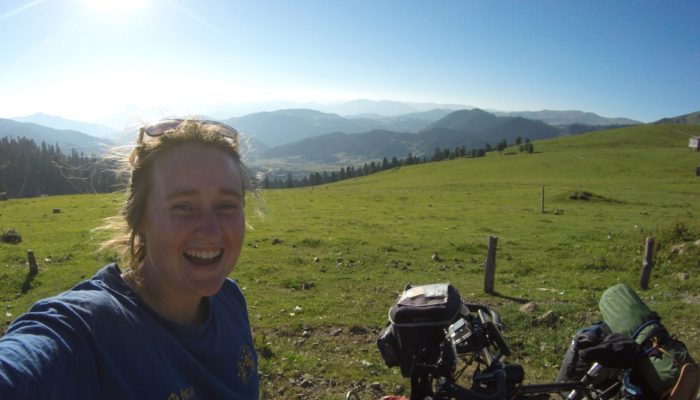Julia Mason (West Island School 2011′)
2015 spring, Julia Mason set out to cycle from London to Hong Kong, but it was not until she was cycling through the western part of Turkey that the enormity of the task really sunk in. “I got stressed about trying to meet daily targets and even hourly targets, and kept thinking if we hadn’t done that or we hadn’t done this,” she says. “It wasn’t till I got to Istanbul that I realised how little it mattered if we were a few days late and how much pressure I was putting on myself for no reason.”
That revelation made all the difference. By early August, Julia was sitting in a vegan cafe in the Georgian capital of Tbilisi, resting for a few days before embarking on the remainder of her 16,000-kilometre journey. Julia is travelling with her British friend Bethany Martin, whom she met at University of Sheffield through a shared passion for reducing food waste. “We both grew up in different environments and yet both of us witnessed an unsustainable level of food waste,” says Julia. She first became aware of the problem when she completed a final year project on food waste at West Island School. That’s when Julia was introduced to bin diving by Christina Dean, the founder of Hong Kong charity Feeding Hong Kong. “It was both elating and shocking to come home with bin bags full of loaves of bread and crates of fruit and vegetables, all of which were perfectly edible,” she says.
Julia hope the trip will raise awareness and nearly HK$300,000 in donations for food charities, including Feeding Hong Kong and Food Angel. Her message is well-rehearsed. “One third of edible food is wasted, enough to feed three billion people, and yet almost one billion people are starving,” she explains. “This is due to an inefficient process from farm to plate, outrageous regulations, excess stocking and unrealistic expectations of consumers driven by an ever demanding, ever competitive market. When we needlessly throw edible food away not only do we inflict an unnecessary strain on world hunger, but also unnecessary major loss of the world’s resources that went into the production of this food, resulting in countless environmental and economic implications.”
It is a worthy cause, but one that has not gone unreported. Julia and Bethany needed a way to grab the public’s attention, which is why they decided to embark on an epic bicycle trip from one end of the Eurasian landmass to the other. The two are posting regular updates to their Facebook page called Forks on Wheels as they travel, and their exploits have already garnered attention in the British and Hong Kong media. But their trip required more than just political conviction; it needed a leap of faith, as neither Julia nor Bethany had attempted such rigorous cycling before. Until now, Julia’s longest bicycle journey was a five-day trip around Taiwan.
It was a tough start. “Our legs were constantly in pain, no matter how much rest we got,” says Julia. “It wasn’t just the biking part that tired us out, it was the finding a campsite, cooking, writing, and being outside all the time. We were eating all the time. Now our bodies are more used to it and only after a hard hill climb do I feel it in the morning.”
Four months in, there have already been too many memorable experiences to count. There have been scary moments, like when Julia and Bethany were camping in a German field, only to wake up at half past three in the morning to find themselves in waist-deep water after the Danube River flooded. In Turkey, a meal of rich local cheese did not sit well with Julia. “When you wake up to the 30-second ‘I’m going to vomit’ warning, there is quite an art to quick tent exiting,” she says. “It includes unzipping the tent and sleeping bag, catapulting out of both simultaneously followed by a commando roll to the nearest clear ground – as far away from the tent as possible.”
But there have also been surprising, even transcendent experiences: the view from a 2,150-metre mountain on the shores of the Black Sea; the sincere hospitality the pair encountered in Serbia, and the time when they were setting up camp in Turkey and were invited to stay with a local family who were enjoying their nightly iftar feast to mark the end of a day of fasting during Ramadan. Julia is normally vegetarian, but she has opened her palate for the trip; she says the best meal so far is a tossup between a bone marrow soup, goulash, tomatoes and meatballs in Hungary, or a tomato and egg dish in Turkey.
Along the way, Julia has found new insight into the problem of food waste. “What has been very interesting is how cultural traditions and even religions can create food waste,” she says. In Georgia, a customary supra feast requires an excessive amount of food to reflect the hosts’ wealth and generosity. Iftar meals in Turkey are customarily overabundant, with large amount of leftover food going to waste.
They have also encountered people who are making an effort to solve the problem. “In Western and Central Europe we found many initiatives and food waste entrepreneurs,” says Julia. “As soon as we got to Hungary and Serbia, we found that the food produce was from a much more local level, and the further east we’ve gone the more we’ve found that. In Turkey, outside of Istanbul, almost everyone in villages and even small towns has their own vegetable patch, livestock and chickens.”
It is a far cry from Hong Kong. “Hong Kong is in the highest bracket of food wasting cities,” says Julia. “People eat out all the time, so much food is imported from far and wide, there are only a few food banks. I still feel there is very little being done especially in terms of educating the local population.”
There is still plenty of time to bring the message home. Julia and Bethany have another several months of cycling ahead of them. The weather has already been extreme, from cold rain in Germany to 42-degree heat in Georgia – “The wind in your face is like a hair dryer blowing and there is no way of cooling down,” says Julia. They are prepared for even more challenging conditions. “First we’ve got a thousand-kilometre stretch of desert with one to two hundred kilometres between small tea houses dotted along the road. Next we’ve got a 3,000-metre-high mountain range to get over. Fingers crossed the snow won’t be too heavy. When we enter China which will be coming up for the end of October, it’ll be a race to get across the Taklamakan Desert and towards Chengdu.” As winter descends on the high plateaus of western China, Julia says the trick will be to have enough dry clothes to change into when they stop to make sure their sweat does not freeze.
Even after so much time on the road, though, Julia is looking forward to the weeks to come. “We aren’t trying to set records and race across, we do like to take our time, to meet people, explore the areas,” she says. “If I haven’t been on the bike for more than a day I’m itching to get back on. Like now – I cannot wait to get back into the gruelling heat and climb another mountain.”









